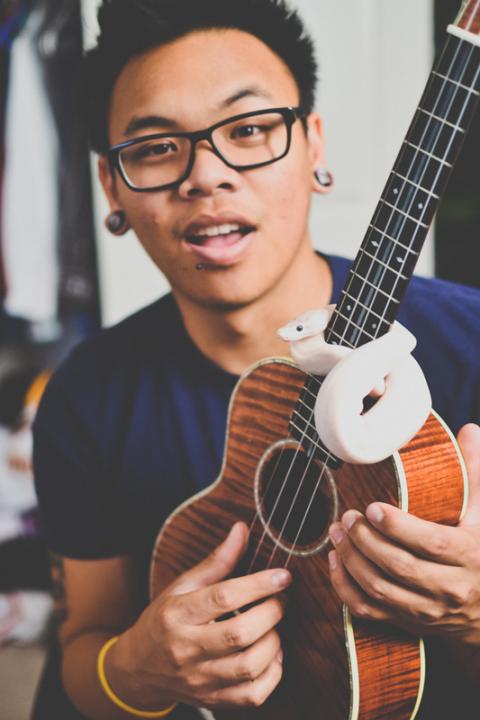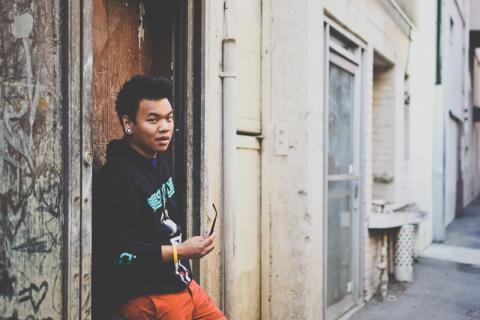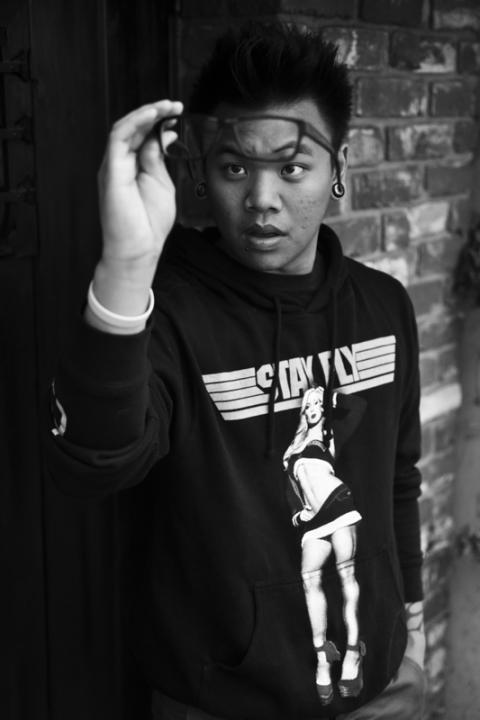Alumni Profile: AJ Rafael '10

Alumnus AJ Rafael is a social media sensation, boasting more than 94 million YouTube video views.
Photo by Chasz Chavarria

Rafael expanded his music education at Berklee, perfecting his performance skills.
Photo by Chasz Chavarria

YouTube and other social media have provided Rafael with dynamic platforms to share his music and build an audience.
Photo by Chasz Chavarria
In 2004, the summer before his sophomore year of high school, AJ Rafael ’10 got his official start as an internet musician when he shared his first song via Myspace. Incidentally, the tune was about a girl he met online. This was all before the pioneer social networking site provided a platform for music uploads, so in typical innovative fashion, Rafael created a workaround using JavaScript and HTML to feature his tunes via RealPlayer software.
“I was the only one in high school with a digital camera taking pictures. I was obsessed with technology,” Rafael, 23, recalls from his home in Riverside, California.
He’s still obsessed. And he’s still innovating. Rafael has made it his business to embrace the latest developments in social networking to push his music out. With more than 94 million views and 400,000-plus subscribers, he’s a YouTube sensation. In 2008, he became a YouTube partner and late last year signed with the YouTube network Maker Studios. Meanwhile, he has more than 130,000 Twitter followers.
But his evolution wouldn’t have been complete without a stop at Berklee to grow his songwriting and performance chops. Inspired after connecting with Armsted Christian at Berklee’s summer songwriting program in Los Angeles, near his native Moreno Valley, he set his sights on the East Coast.
“Berklee has been a big part of me and my story,” says Rafael, who majored in songwriting.
In between making music and posting it on YouTube, Rafael shared his insights about his Berklee experience, his thoughts on social media strategy, and his commitment to making Asian American musicians more visible.
Not surprisingly, Rafael signed off the phone call with these parting words: “I’ll be online.”
The following is an edited and condensed version of that conversation.
What did Berklee add to your already robust music experience?
I wanted to have the college experience and at the same time have it be something I love. . . Going to Berklee helped legitimize it. It helped [people] realize I am taking music seriously.
Before Berklee, I was doing the singer-songwriter stuff alone, posting tracks on Myspace. When I came to Berklee and put a band together, it brought brought new life to my music, and even my image and presence. It kind of changed the game in that aspect. The teachers who helped me with and critiqued my performances brought me to a whole other level regarding my performing and image.
My performance classes also helped so much with putting on a quality show. I learned a lot about band performance. I was in transition from going solo to having other musicians with me.
What has your YouTube presence done for you as an Asian American artist?
Asian Americans are not well represented in the media. For example, Harry Shum on Glee, people don’t even know his name. For us, that’s huge. There aren’t any main character Asians anywhere. For us to come out on YouTube being ourselves and being “cool” has been a huge thing for our audience and Asian Americans, to have something to look up to in the real world.
Beyond that, I credit Myspace for what it did for musicians and independent artists as a whole. It carried through to YouTube. Today it kind of all links together. Myspace didn’t only open up the doors for independent artists, it provided the chance for more underrepresented Asian American musicians and their audiences to step up.
What professors at Berklee made an impression?
Nancy Morris accompanies herself and taught a class on that. When I was at Berklee, a lot of people knew me as the guy who had six million plays on Myspace. Nancy wasn’t afraid to tell me when I was doing something wrong. In that sense, she taught me so much about performance. I think I respected the music a lot more after Nancy Morris. I did my own version of “How Sweet It Is (to Be Loved by You).” It was really shuffly. She taught me to bring it back to the original, to not be gimmicky. She taught me to bring it back to the root and go from there.
Livingston Taylor taught me to respect the music and to present the story. The main thing is presenting yourself and not go overboard.
Scarlet Keys did a good job of making it easy to write a song, even if it’s not life experience. She helped me really build that songwriting toolkit so I don’t have to wait for inspiration to come around. Before I would wait for something to actually happen.
Tell me about your social media strategy.
I put my first video on YouTube in September 2006. It was a medley video of just me playing the piano, a song by the band Meg and Dia. Myspace had a feature called “Top 8,” where you could feature your best friends or bands on your profile. The fact that Meg and Dia left me on there was big back in the day.
People have a strategy now, but I didn’t then. My strategy now is about riding the wave. Right when Twitter came up, I signed up for it. My strategy is also about staying relevant. To build a fan base on YouTube, you need to know what’s popular right now, get a feel for what people want. I do covers and mix in originals. Through the covers, I direct traffic to my original stuff.
I try to keep it real. I feature top 10 iTunes songs, but not in a way just to garner views. I want to relate to these songs to stay real. Staying real with my audience is a big thing. This year, I also started posting videos every week. Getting new fans and keeping communication up with my current fans is important.
Being on a YouTube network helps financially, as the ads up there cost a little more money. But most of all, the whole creative team is willing to help you, especially analytically to help get you more views. They do a lot of things to help optimize your channel. It’s really like another team besides your management.
To what do you attribute your success?
Relatability. That’s easy to do in my genre (pop). Just being real with people and sharing my experiences through my songs. I haven’t had a really viral success story like Justin Bieber. I’ve had to work on my vocals and musicianship. For me, it’s about building this channel and being real with people.
What’s the distinction between an online and in-person fan base?
For me it’s always been melded together. Growing up on the whole social network, I would see fans and say, “Hit me up on Twitter.” For me there’s no way to separate. Back in the day, it’s the equivalent of U2 and Radiohead not getting radio play but selling out shows. It’s a whole different world for us online.
How would you characterize today’s social media landscape?
The fact that I am financially stable just shows that social media and YouTube especially is going in the right direction. People who are creative can make a living doing this. I think my current situation is a testament to that and works in favor of being an artist, which is cool.
